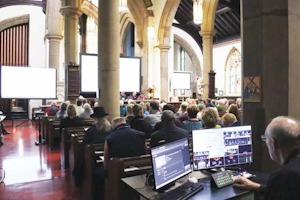“The way in which you read something can really change the way people hear it.”
That's a comment from The Rev. Chris Roth of the Anglican Diocese of Calgary who recently put together a half-hour You Tube video to discuss reading scripture in worship. He explains what is read and why during worship (Old Testament, psalms, epistles, gospel), and he offers several useful tips for readers.

He urges readers to know their text extremely well. “Practise the text many times and always do it aloud,” he advises. “Know the meaning as best you can. You should be able to tell somebody else what the story is about.”
To learn the context of a scriptural passage, he suggests consulting montreal.anglican.org/comments which provides the meaning and importance of each entry in the Anglican three-year cycle of readings.
He says a reader can also use a good study Bible to learn what a passage is about. “If you're confused, it will come across to the congregation,” he cautions.
“Avoid reading too quickly or too quietly or in a flat monotone,” he advises.
It's very important to read with feeling, he says, because it will help the congregation to understand the words. For example, is a passage you're practising sad or joyous? “Match your tone to the mood of the story,” he says.
Readers can stumble over unfamiliar words or place names. Rev. Roth recommends checking proper pronunciation on www.biblegateway.com and speaking the name confidently during worship. Mark up your page to be sure you remember the correct pronunciation.
It's also important to know how to use the microphone properly, make sure your printed reading is actually at the lectern before the service, and to pause briefly before you begin and when you finish a passage.
In his video, Rev. Roth says that scripture is a highlight of worship, along with the sacrament of the eucharist.
“So, be heard clearly, take your time, know your text really well, and say the words with feeling to show that you understand them,” he sums up.
-- by Ann Deveau


